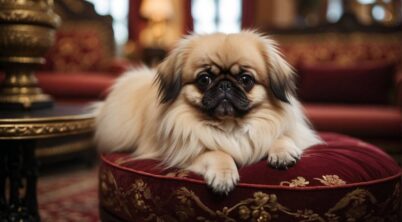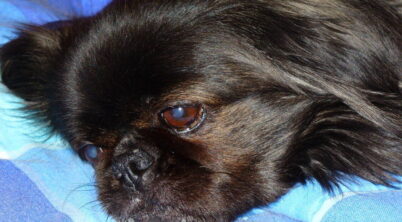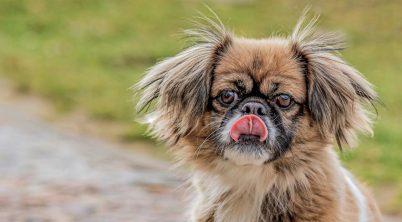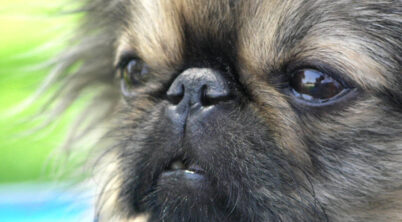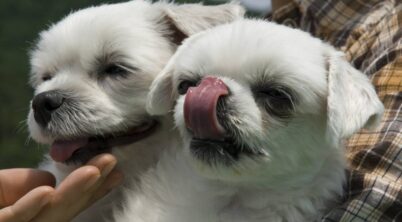Pekingese dogs are known for their unique personalities and affectionate nature, often expressed through behaviors like licking. Many owners find themselves wondering, why does my Pekingese lick so much? This behavior can stem from various reasons, including the breed’s inherent way of showing affection and establishing social bonds with their humans.
Another potential cause for excessive licking in Pekingese might be tied to underlying health issues. Licking, especially of the paws, could indicate conditions such as allergies or skin irritations. It’s essential to observe the context and frequency of the licking to determine if it warrants a visit to the vet.
Moreover, excessive licking could also be a coping mechanism for anxiety or boredom. Providing ample activities and distractions can help mitigate this behavior. In essence, understanding the motives behind your Pekingese’s licking is crucial in addressing and managing it effectively.
Table of Contents
Understanding Pekingese Licking Behavior
Pekingese dogs exhibit licking behavior for various reasons, which can indicate their personality traits, emotional states, and interactions with their environment. These reasons include communication and affection, signs of stress or anxiety, and exploration of taste and surroundings.
Communication and Affection
Pekingese dogs often use licking as a form of communication and to show affection. Licking is a behavior deeply rooted in their pack instincts.
From an early age, mother dogs groom their puppies by licking, which is a primary way to bond and show care. This learned behavior continues into adulthood, where licking their owners signifies trust and love.
Licking can release endorphins, which makes it a soothing activity for the dog. Owners may notice that their Pekingese licks them during moments of quiet bonding or after being away, acting as a sign of comfort and reassurance.
Signs of Stress or Anxiety
Licking can also be a sign of stress or anxiety in Pekingese dogs. When they feel nervous or uncomfortable, they may resort to this behavior as a self-soothing mechanism.
Stress triggers may include loud noises, changes in routine, or the presence of unfamiliar animals or people. For instance, during a thunderstorm, a Pekingese may lick its paws excessively as a way to manage anxiety.
Owners should stay alert to any changes in behavior that accompany the licking, such as trembling or hiding, as these can indicate underlying emotional distress.
Exploration and Taste
Pekingese dogs also lick to explore their environment and satisfy their curiosity about new tastes. This behavior is part of their natural senses and instincts.
Young Pekingese, in particular, use licking to gather information about their surroundings, which includes tasting objects, people, and other animals. This exploration helps them learn about their world, identify different scents, and understand their environment better.
However, if a Pekingese licks the same spot repeatedly, owners should check for potential issues like allergies or skin irritations that might be causing the dog to lick more than usual.
By identifying the context and frequency of the licking behavior, owners can better understand their Pekingese’s needs and emotions.
Health-Related Causes of Licking
Pekingese dogs may lick excessively due to varied health issues, including dental problems, skin conditions, allergies, and pain or discomfort. Identifying these causes can help in managing and treating the behavior more effectively.
Dental Problems
Dental issues are a common reason for a Pekingese’s persistent licking. Conditions such as gingivitis, tooth decay, and periodontal disease can cause significant pain and discomfort.
When dental disease sets in, dogs often lick their lips or focus on specific areas to soothe the irritation. Bad breath, drooling, and visible plaque are common signs of dental problems. Regular dental care, including frequent brushing and professional cleanings, can help prevent these issues. If licking persists, consult a veterinarian to examine and treat any potential dental issues.
Skin Conditions and Allergies
Skin conditions and allergies often drive excessive licking in Pekingese dogs. Dogs can have reactions to numerous environmental elements like pollen, dust, or food items, leading to skin irritation.
Hot spots, rashes, and skin infections are frequent in allergic reactions. Dogs may lick or bite at itchy areas attempting to alleviate the discomfort. In cases of severe irritation, licking can lead to additional infections. Veterinarian consultation is crucial for effective diagnosis and treatment. Treatment may include hypoallergenic diets, medicated shampoos, and allergy medications.
Pain and Discomfort
Pain and discomfort from various health problems can cause a Pekingese to lick excessively. Issues such as arthritis, internal injuries, or surgical wounds often lead dogs to focus on the painful area.
Signs of pain include behavioral changes, limping, or restlessness. Persistent licking might be a coping mechanism, aiming to manage the pain. Consulting a veterinarian is essential to pinpoint the source of discomfort and provide appropriate pain relief. Treatments often include medications, physical therapy, or changes in the dog’s environment to support better comfort levels.
Proper identification and treatment of these health issues can greatly alleviate excessive licking, improving the well-being and quality of life for Pekingese dogs. Regular check-ups and attentive care ensure any health problems are swiftly addressed.
Behavioral and Environmental Factors
Pekingese dogs may lick excessively due to various behavioral and environmental influences. Key factors include boredom, routine, and training methods, which can all impact this behavior.
Boredom and Inactivity
Pekingese dogs are intelligent and need mental stimulation. When they lack adequate physical or mental activities, they might resort to licking. This can be seen as a self-soothing mechanism.
Providing toys, engaging in daily walks, and regular playtime can minimize boredom. Interactive toys like puzzle feeders can be particularly effective. Boredom-induced licking is common among dogs left alone for long periods. Ensuring they have enough interaction and activities can help curb this behavior.
Routine and Environment
Consistency in the dog’s daily routine is crucial. Pekingese can get stressed by abrupt changes in their environment or routine, leading to excessive licking. Environmental stressors such as new furniture or different feeding times can trigger this behavior.
Owners should strive to maintain a stable environment and consistent daily schedule. Regular feeding, walking, and playtimes help the dog feel secure and reduce anxiety-related licking. Familiar surroundings and predictable routines are essential for the well-being of Pekingese dogs.
Training and Positive Reinforcement
Training and positive reinforcement play a significant role in managing a Pekingese’s licking behavior. Teaching commands like “leave it” or “no lick” can be helpful. Rewarding your dog when they obey these commands reinforces good behavior.
Using positive reinforcement techniques such as treats or praise encourages them to follow desired behaviors. Consistency in training routines is essential. Dogs respond well to consistent rules and rewards, which can effectively reduce unwanted licking. Avoid scolding, as it might increase anxiety and exacerbate the behavior.
Grooming Habits of Pekingese Dogs
Pekingese dogs have distinctive grooming habits that are essential to their health and well-being. They engage in self-grooming to manage their thick coat and often require human assistance to maintain their cleanliness and prevent matting.
Self-Grooming
Pekingese dogs are known for their elegant and dense coat, which necessitates frequent self-grooming. They often lick themselves to clean impurities and manage their fur. This grooming behavior helps prevent tangling and ensures the coat remains free of dirt and debris.
However, their short snout and dense fur can make self-grooming challenging. Regular licking helps manage the outer coat but doesn’t always address issues such as matting in the undercoat. Owners must monitor their pets to ensure that self-grooming is effective and doesn’t escalate into excessive licking or irritate the skin.
Assistance in Cleaning
While Pekingese dogs strive to groom themselves, human intervention is essential. Daily brushing using tools like slicker brushes is crucial for preventing mats and tangles.
Attending to both the outer coat and dense undercoat is necessary. Regular brushing helps distribute oils, maintaining a healthy shine and reducing shedding. Beyond brushing, periodic baths with dog-safe products aid in maintaining optimal hygiene. Owners should pay careful attention to areas prone to matting, such as behind the ears and under the legs, to ensure thorough cleaning and grooming.
Providing Comfort and Care to Your Pekingese
Providing comfort and care to your Pekingese involves attentive exercise routines, a balanced diet, and emotional support to ensure their happiness and health.
Exercise and Playtime
Exercise is crucial for Pekingese to stay healthy and calm. Regular activity helps prevent behavioral issues and keeps them engaged. Two 20-minute walks per day is ideal.
Interactive toys provide mental stimulation and can prevent boredom. Fetch, for instance, can be enjoyed indoors or outdoors. Taking them to a dog park ensures they socialize with other pets, enhancing their trust and bonding abilities. Obedience training can integrate exercise with learning, promoting both physical and mental well-being.
Diet and Nutrition
A balanced diet is fundamental for the health of a Pekingese. High-quality dog food tailored to their age, size, and health needs is recommended. Portion control is essential to prevent obesity, which is common in small breeds.
Incorporate lean proteins, healthy fats, and essential vitamins. Always provide fresh water to keep them hydrated. Monitoring treats and snacks helps maintain their ideal weight. Consulting a veterinarian for personalized dietary advice can address specific health concerns, ensuring their optimal nutrition.
Emotional Support and Socialization
Pekingese are loyal and affectionate, requiring ample attention and affection from their owners. Providing them with consistent emotional support helps in developing a strong bond. Regularly engaging in playful interactions strengthens trust.
Socializing them with other pets and children fosters positive behavior. This can be achieved through visits to dog parks or arranging playdates. Creating a safe and calm environment at home is essential, where they feel secure and loved. These efforts contribute significantly to their overall emotional well-being.
Significance of Routine Veterinary Check-Ups
Routine veterinary check-ups are vital for detecting underlying health issues in Pekingese dogs. Regular visits allow veterinarians to identify medical conditions that may not be immediately visible. Early detection can lead to more effective treatments.
Veterinarians provide valuable advice on diet, exercise, and grooming. They can recommend specific strategies tailored to the unique needs of Pekingese dogs. This helps in maintaining overall health and well-being.
Medical conditions like allergies, hormonal imbalances, and skin diseases may cause a Pekingese to lick excessively. Consulting a veterinarian can help diagnose and treat these issues. Effective management reduces discomfort and improves quality of life.
Routine check-ups also ensure timely vaccinations and preventive care. This is crucial for protecting against common illnesses. Regular assessments of dental health, weight, and other physical factors are important too.
A list of benefits includes:
- Early identification of health issues
- Personalized care advice
- Emphasis on preventive measures
- Monitoring of chronic conditions
Regular consultation with a veterinarian fosters a proactive approach to health. It ensures that any potential problems are addressed promptly. This reduces the chances of complications developing.
Effective Training Techniques for Pekingese
Training a Pekingese requires understanding their temperament and establishing clear boundaries. Due to their independent nature, consistency and patience are essential.
Setting Boundaries and Limits
Setting boundaries is crucial when training a Pekingese. This breed can be stubborn, and they need to understand their limits. Use consistent commands like “sit,” “stay,” and “come” to reinforce good behavior.
Positive reinforcement works well, using treats or verbal praise. Avoid harsh corrections, as Pekingese do not respond well to negative reinforcement. Short, frequent training sessions keep them engaged without overwhelming them.
Crate training can help establish a secure space for your Pekingese. Start with small intervals and gradually increase the time they spend in the crate. This method helps them learn self-control and reduces anxiety.
Harnessing Pekingese Temperament
Their temperament is affectionate but can be challenging due to their independent streak. Establishing yourself as the leader is important. Be calm and assertive.
Socialization from a young age helps manage their behavior around other dogs and people. Expose them to diverse environments and situations to reduce fear and anxiety.
Engage them in activities that stimulate their mind. Puzzle toys and obedience games can be effective. This breed thrives on mental challenges and rewards.
Patience and consistency are key. Regular practice and positive interactions will foster a well-trained and happy Pekingese.
Identifying and Responding to Problematic Licking
Understanding why a Pekingese exhibits excessive licking behavior is crucial. Key areas to focus on include distinguishing between normal and excessive licking and knowing when it’s time to consult a professional.
Differentiating Between Normal and Excessive Licking
Normal licking is a common behavior linked to bonding, affection, or even grooming. This kind of licking is usually occasional and doesn’t disrupt daily activities.
In contrast, excessive licking can indicate underlying issues. Behavioral reasons such as separation anxiety or boredom can lead to constant licking. Medical reasons could include allergies or skin conditions, where the dog might lick paws or specific areas.
Regular licking might be considered normal if it doesn’t interfere with the dog’s typical behavior and well-being. However, constant or obsessive licking often requires a deeper look to ensure the pet’s health and happiness.
When to Seek Professional Help
If a Pekingese’s licking becomes incessant and begins to affect their quality of life, it is essential to consult a veterinarian. Medical reasons like allergies, infections, or pain should be ruled out first, as they might require specific treatments.
A veterinarian might also refer the pet to a behaviorist if the issue stems from behavioral problems. Addressing behavior problems might involve changes in the dog’s environment, increased mental stimulation, or training techniques to redirect the behavior.
Separation anxiety or intense stress can also lead to excessive licking. Professional intervention can provide strategies to alleviate this anxiety, improving the dog’s overall well-being.


